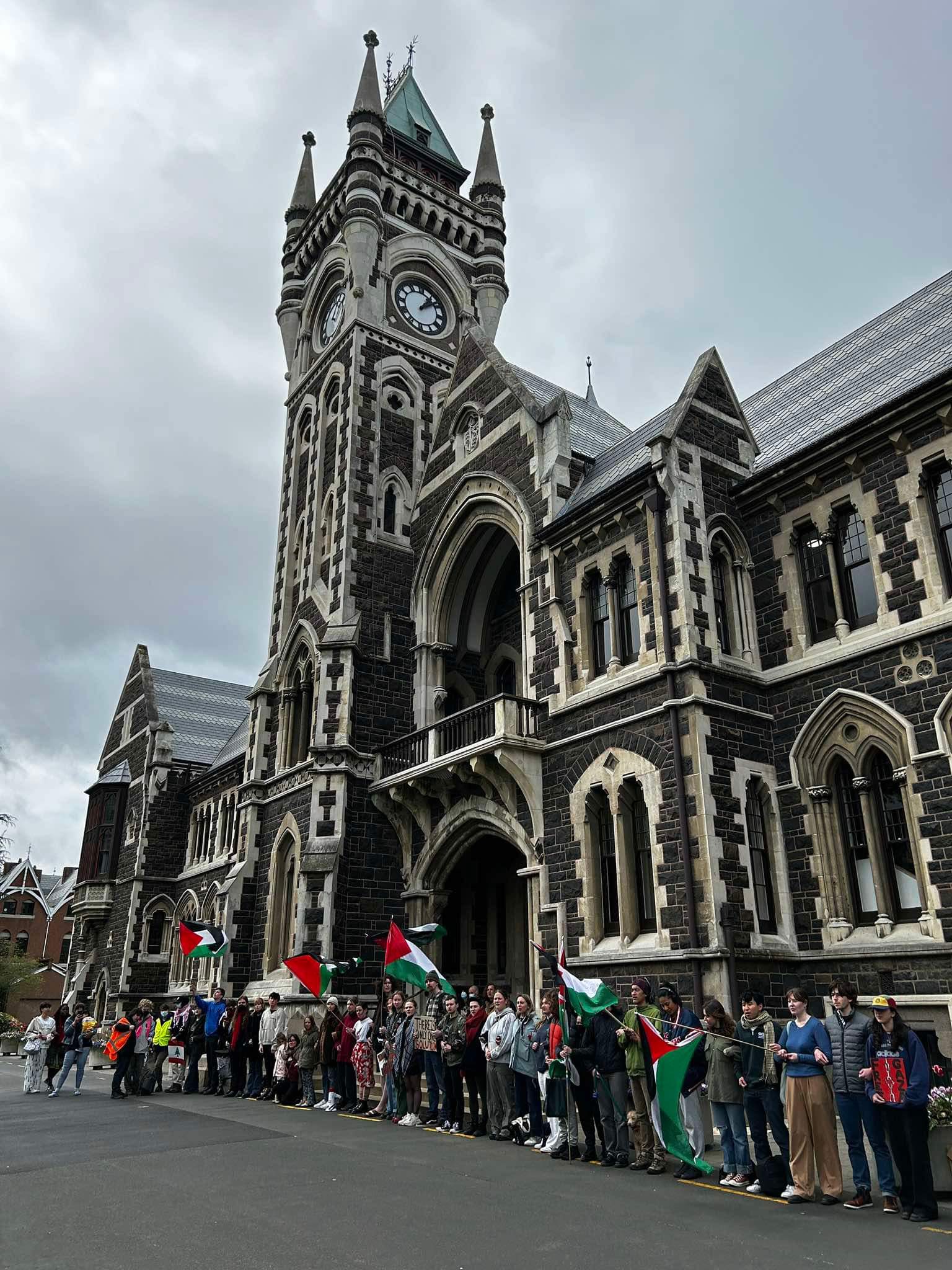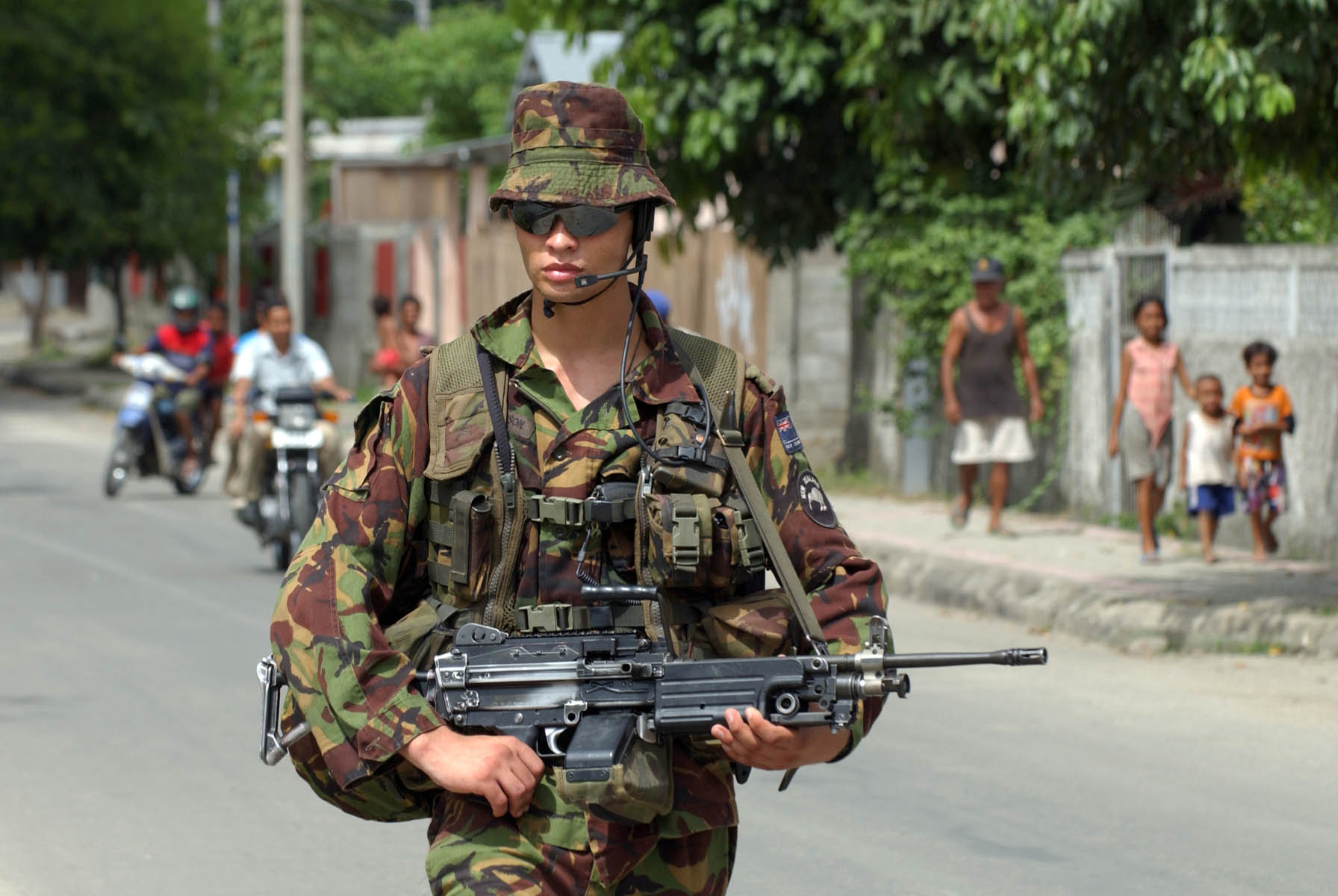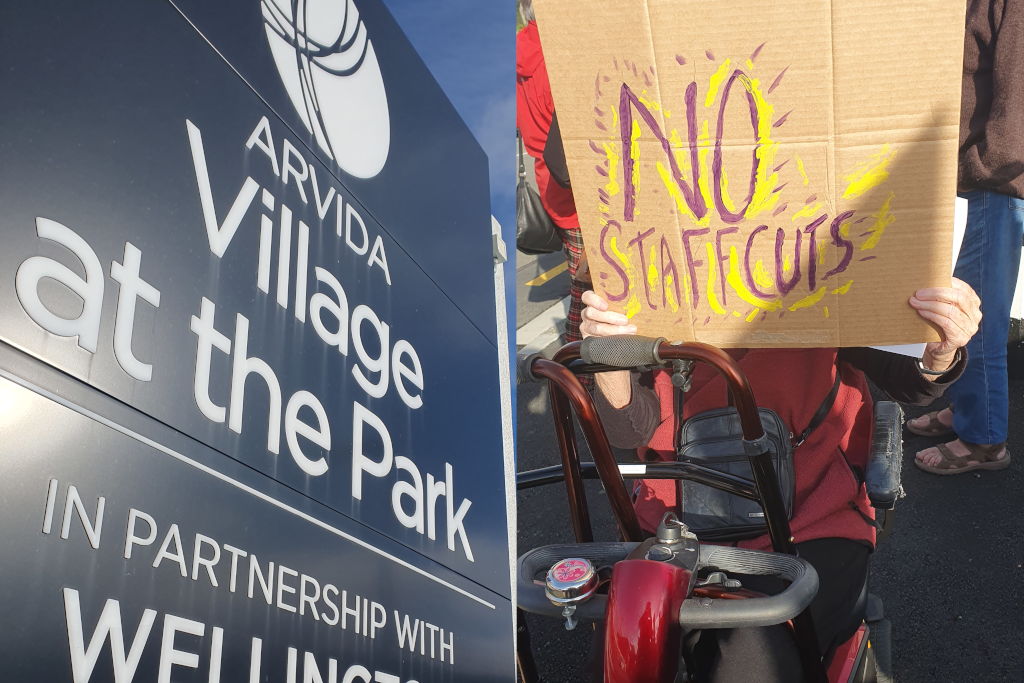In 2016, a vote among people of Te Atiawa, Taranaki, Ngāti Ruanui, Ngāti Tama and Ngāti Mutunga vetoed the sale of jointly held iwi land at Shelly Bay to property developers. The land in question, at Shelly Bay, was held by the Port Nicholson Block Settlement Trust, a body formed by the Crown to be responsible to iwi. The board of the trust sold the land in secret to The Wellington Company in 2017, directly in breach of this responsibility and democratic process. Now, mana whenua group Mau Whenua occupies the land at Shelly Bay against the sale. Mau Whenua member Shamia Makarini, of Te Atiawa, Taranaki, Ngāti Ruanui, Ngāti Tama, and Ngāti Mutunga, speaks with Elle Kingsbury about the occupation.
Do you want to describe the general situation, why it’s important for people to be here, what’s going on?
Why is it important for people to be here? Because it’s an injustice and a grievance, that’s happening in 21st century Aotearoa, and we should be better than that.
I know everybody sees that these situations are complicated, and this is no exception to that. On one hand, it is complicated. On the other, it’s quite simple. What’s happening here is a repeat of history, and in an uncanny way. What happened in the 1800s, was basically… the New Zealand company came, and private developers came and did a deed of sale and purchase, and that was signed off by a couple of people, not the whole iwi — and not, definitely not selling the land…. Took 160 years to be declared invalid.
And essentially the same things happened with the Wellington Company and our settlement trusts… at the time of settlement it came up from Defence being a property that they didn’t need any more, and we said, “Look, we really want it back.” Iwi said, “We want Shelly Bay back, we want the whole peninsula back, actually, but let’s start with Shelly Bay, because that’s come up, for now.
When was this?
2008. The crown said, “No, we can’t give it back to you as a cultural redress, because it’s worth too much. So they’re saying, money-wise it’s worth too much, and we’re saying, well, culturally and spiritually, and for our future, it’s worth more than that. So we want it back.
So they said you can buy it back, you can buy it back for 23 million, and our pākeke at the time negotiated them down to… 15.1 I think it was. And we used our settlement money to get it back. We had to buy it back, so that grievance actually was never really settled was it?
Fast forward a few years, there’s certain trustees in place, leadership has broken down a bit. In 2015 the settlement trust asked iwi on 24th of December, we received some voting papers, the day before Christmas, it was pretty weird timing. Asking for the trust to sell all the land at Shelly Bay to the Wellington Company, and of course, some of us read that and said “What the hell’s going on here? We don’t sell land. We just got that back, why would we sell that?”
They shut their offices, wouldn’t answer questions. It was all really shady.
And… we were talking to our brothers and sisters, or first cousins, or aunties and uncles about, “Hey, did you get your voting papers” and they’re like “No!?” You know, and then they’d ring the trust and say, “Where’s my voting papers?” And they say, “Well, you’re not registered”, and they’ll say “Well we were registered before settlement” you know, so “Well, you must have moved.” “No I’ve been in this house for 30 years.”
We had 19,000 registered members in the trust. Somehow those trustees, those particular trustees between 2014 and now have managed to lose 12,000 of that 19,000.
Legally the trust board required a 75% vote from membership to approve the transaction. Of the trust members who were able to vote and did so, only 51% voted for the sale.
The iwi said no sale. And so that should have been the end of it.
We had a unanimous resolution at one of our [Port Nicholson Block Settlement Trust’s] AGMs, and it was well attended, at Pipitea Marae, I think it was 2016, that the trustees stop all negotiations with the Wellington company, and all discussions about the sale shall obey and come back to the iwi with other options and to hear what the people wanted, because it wasn’t a sale, and it definitely wasn’t to the Wellington Company.
They ignored that resolution. They got around the major transaction clause by saying that it wasn’t a major transaction, because they broke it up into four parcels and sold them all separately. The Wellington company was fully aware that the trustees did not have the mandate to sell. They were fully aware of that and they participated… they changed the deals so that they could buy it. So that’s why we refer to this as legalized theft… the deed of sale and purchase for this whenua is not valid, in English or Māori law. That’s what we’re saying, and that’s what we believe is true.
Residential and professional tenants at Shelly Bay were formally evicted by The Wellington Company in July. Most tenants chose to comply with the eviction. Mau Whenua remains in occupation. They are expecting a new push from The Wellington Company to begin construction. As we move out of lockdown, they are once again asking for support in resisting this.
So, what can people do to support Mau Whenua here at Shelly Bay?
We’ve got quite a bit of things outlined on our facebook page and our Instagram…. you can be actively involved, participate, physically come down to the whenua, help to hold the whenua, we have a tikanga which we work under which I think you’ve seen. As long as people are operating within that tikanga we welcome everybody, so long as they are on the same kaupapa of rangatiratanga through kia mau ki te whenua. Welcome to come down.
Self sufficiency is probably a good idea as much as possible, and we’ll provide manaakitanga as much as we can.
And then particularly for people who aren’t local, you can contribute by sharing and raising awareness of our kaupapa. That’s a huge one. I’m talking to whānau who might be in Wellington to get them to come and support.
Even writing letters to Council, Greater Wellington Council still haven’t granted resource consent for this development. So there’s still a chance to send a letter opposing the development and why. Correcting wrong information is really important. We’ve got our bank account you can koha to. We have people bringing down supplies, every now and then on our pages, we’ll put out a karanga for specific items. And some people just donate money so that we can receive those items or they’ll bring them down which is really appreciated.
Are you currently looking for food donations, blankets, anything like that?
Definitely. At the moment, we have access to water and power — we’re expecting that the services on site are going to be turned off with the last tenants evicted in a couple of days, Friday. Specific things we’re looking for are, yeah, warmth — cooked kai, it is quite difficult to cook on site — we’re having more than usual of our kaitiaki out here on site so you know, if you can make a big pot of something that is always welcome. Or pick up and eat kai that you don’t need to chuck in the microwave. And gas bottles. All those sort of things, warmth and kai are the main things at the moment.
And are you looking for more people to stay over at the whenua here, or just to visit and spend time here?
Yes is the short answer to that, yes we definitely are. As long as people are on the kaupapa and adhere to the tikanga, we’d love people to come under those two things. Definitely. Because there is a lot of mahi to do. And it’s a big site to cover, a couple of hours patrol. If we have more people, we’re also wanting to do things like get into town into the community to raise awareness and be physically saying with our placards and our beautiful artworks and those sort of things — so that needs people and people who understand the kaupapa and can hold the whenua as well.
Mau Whenua is asking that visitors during Covid alert level 2 follow guidelines by wearing masks, scanning in on entry, practicing physical distancing, and using hand sanitiser.
You were mentioning before Mau Whenua is in touch with four or five other land protection struggles across New Zealand, and that all of these groups have been dealing with problems in the Treaty settlement system. Do you want to talk about what those other those other struggles are, and what the details of the Treaty settlement system are which create these problems?
[There’s] us Save Shelly Bay, Protect Pukeiāhua which is in Ngaruawahia, Protect Maunga Puketiti, there’s Pūtiki on Waiheke, and Protect Aotea which is great Barrier Island. And we just kind of saw each other on social media. I thought I might actually just touch base with these other occupations, and see how we can support each other, and as we spoke, it became really clear… in every case and to different degrees, what’s happened is that the crown has developed or prescribed these settlement entities and given the settlement entities unbridled power to do whatever they want, with no accountability back to the iwi members that they are supposed to be representing.
And what’s happened is particularly local government again, but other agencies, will recognize these entities as mana whenua, and for resource consents and things like that, will go to these entities which are crown constructed entities, and not necessarily really representative of iwi at all.
So in each of those occupations for the settlement trust, they have basically signed off on creating a new grievance. That’s what’s happened nationally. So there’s something wrong with that legislation that’s allowing these grievances to occur. Know what I mean?
We’ve been losing our settlement assets, that we fought 160 years to get back, and in this case, paid a lot of money to get back. The plan has always been to receive back in settlement right of first refusal properties in the rest of the peninsula… It wasn’t just Shelly Bay, Shelly Bay was just the first one to come up…. Nobody knows what the settlement trust is up to these days. I mean, that’s why our whanaunga have started occupying up at Mount Crawford by the prison, Matai Moana, the reasons that they are occupying are exactly the same as ours. The Settlement Trust has done the same thing.
Matai Moana opposes a separate sale of Settlement Trust land, up the hill from Shelly Bay.
Would you want to talk about how these struggles fit into work for Tīno Rangatiratanga in general?
In terms of what’s happening here… I talked about our opportunities, our right to self-govern. The Crown has prescribed how our governance entity is supposed to work. That’s not self governance, that’s not Rangatiratanga.
In terms of this whenua here… there are generations who fought to get the chance to be able to decide what we did with our assets. And it’s been taken away — that’s been stolen again… you know, that’s all Rangatiratanga, that’s Tīno Rangatiratanga. That’s what we’re fighting for.
We haven’t lost our mana. We haven’t lost our identity as those five iwi, or our rights in terms of our cultural rights or knowledge. It’s rewriting of history, this entity is suddenly being held up as the iwi, has the mandate… the cultural experts, it’s like well no, no no they’re a crown prescribed entity that are there to manage settlement assets, that’s it. That’s what they are…
And the opportunities within our settlement were huge. They’re gone. You know, at the moment, they’re not there, they’re not available to our people. That’s not Rangatiratanga.
The city council telling us that Taranaki Whānui are the iwi, that’s not Rangatiratanga. They’re dictating to us what iwi is and who iwi is, taking our voice away. That’s not Rangatiratanga. And that’s happening across the country. That’s one of the things that are happening to all of us, that we’ve all identified.
The Local Government Act allows for that to happen, there’s no legal obligation for them to be good treaty partners, they might have it in their policies, but there’s no way to hold them to account.
What Rangatiratanga would look like, well in my opinion that would be actually more about the government taking responsibility for their part in creating this mess. You actually acknowledge and address how you can, like, changing the legislation that allows for this to happen. Y’know, you take responsibility for what you’ve done, and let us get on with being able to decide what we need.









